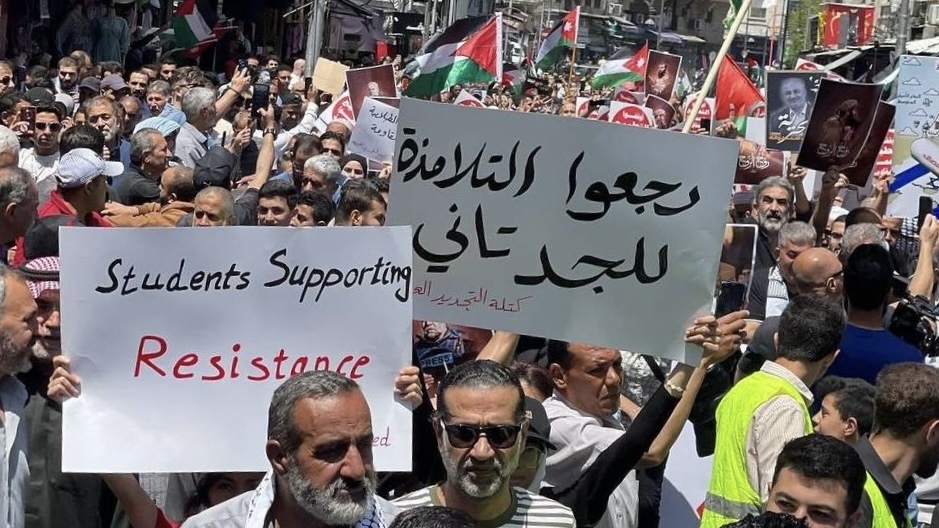Since the recent war on Gaza was launched by the Israeli occupation forces in October 2023, Jordan has witnessed mass protests across the country. Such protests are not unusual for the Jordanian people in spite of their government’s compromising stance on the Israeli entity. Jordanians have taken to the streets for decades in protest over the Israel-Jordan Peace treaty, also known as “Wadi Araba”, that was signed in 1994.
“‘Wadi Araba’ is not peace, ‘Wadi Araba’ is surrender, has been chanted by Jordanians for around 30 years.
In November 2023, Abu Obaida, the spokesperson for Al-Qassam Brigades, the military wing of Hamas, addressed the Jordanian people in a televised speech, calling on them to escalate forms of popular and mass resistance.
“You, our people in Jordan, are the nightmare of the occupation that fears your movement,” Abu Obaida stated during his speech.
The Jordanian people answered Abu Obaida’s call with demonstrations and marches that took place in various parts of Jordan, including the capital Amman, with thousands of participants, who praised Abu Obaida and the head of Al-Qassam Brigades, Mohammad Al-Deif. Some protesters attempted to storm the Israeli Embassy compound in Amman during demonstrations.
Protesters also called on the Jordanian government to end the normalization deal with the Israeli occupation and all other agreements with the entity. The agreements include the “Wadi Araba” peace treaty, the 15-year gas deal, and the water-for-energy deal. These agreements have been a source of outrage across the country for many years prior to the latest Israeli war on Gaza.
In these months of protest, Jordanian authorities have resorted to the use of force against protesters with tear gas and hitting protesters with batons. Scores of protesters were also arrested by the Jordanian security forces including women, and members of the National Forum to Support Resistance and Protect the Homeland, a coalition of Jordanian parties across the political spectrum including leftist and Islamist parties.
The heavy-handed crackdown on activists, protesters, and even those engaged in online advocacy has been denounced by international human rights organizations.
“Jordanian authorities have arrested and harassed scores of Jordanians who participated in pro-Palestine protests across the country or engaged in online advocacy since October 2023, bringing charges against some of them under a new, widely criticized cybercrimes law,” Human Rights Watch said in a statement published on its website on February 6, 2024.
Despite the ongoing suppression by the authorities, Jordanians re-escalated their protests in solidarity with Gaza in March 2024. This was just as Gazans were about to welcome Muslims’ holy month of Ramadan, amidst severe scarcity of food, medicine, and other basic human needs due to the long aid delivery ban that Israel imposed on the Gaza strip upon the eruption of the war.
The re-escalation of protests in Jordan was also in response to recurrent Israeli threats to attack Rafah, in southern Gaza strip. Over 1 million Gazans were displaced to Rafah due to the Israeli assault on the rest of the Gaza strip, making the southern city one of the most densely populated in the enclave.
Dozens of Jordanian protesters attempted to storm the Israeli embassy compound in Amman at the end of March 2024 once again. Jordanian security forces were not less suppressive while dispersing protesters with tear gas bombs and baton sticks in addition to wide spread arrest campaigns.
Some Jordanian officials went further in their criticism of the pro-Palestinian protests in Jordan by accusing Hamas of inciting protesters to pressurize Jordan to take a path other than peace with the Israeli side, which in its turn would jeopardize Jordan’s national security.
These accusations were confronted by the Jordanian masses’ high level of awareness, and with Abu Obaida’s influential words indicating the historical unity between the Jordanian and Palestinian people. “Jordan is from us, and we are from Jordan”, Abu Obaida said in his last televised speech on April 23, 2024, describing Jordan as “one of the most important Arab fronts”. The speech motivated protests to proceed in demonstrations ignoring the voices of the compromised authorities that tried to demonize their intentions and demands.





